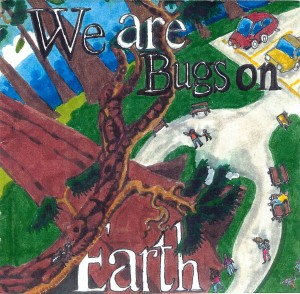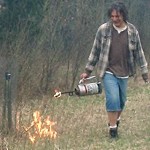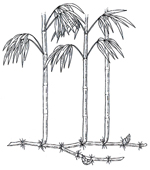Permaculture interest group formed in Urbana, IL. Variously named the “Urbana Permaculture Cooperative” and “Permanish Urbanculture”. The group met at the School for Designing a Society and at Anacroatan. On December 15, 2000, the Urbana Permaculture Project was incorporated as a Not-for-Profit Corporation in the State of Illinois.
That same month a small book entitled “We are Bugs on Earth” was published out of a discussion about Permaculture at the School for Designing a Society. The book was intended to be an introduction to Permaculture for pre-literate children.
February 8, 2001
The Urbana Permaculture Project hosted its first Plant Ordering Party at Anacroatan. Plants were mail-ordered for the first three Permaculture sites in Urbana: Anacroatan, the Oregon Street Community Garden, and the School for Designing a Society.
April 17, 18, 19, 2001
“Permaculture hijacks the School for Designing a Society”
April 17 – 10am: Permaculture and Fundamentals with Rob Scott and Susan Parenti at Anacroatan
April 17 – 2-5pm: Junk for Joy Field Trip
April 18 – 10am: Introduction to Permaculture with Ben Emerick at Anacroatan
April 18 – 5:30-7:30pm: Design Charrette at the Oregon Street Community Garden
April 19 – 10am: net works: metaphors in relationships biological and social with Susan Parenti and Andy Trull
April 19 – 8:30pm: A Design Criterion with Brandy Watts at Anacroatan
July 2001
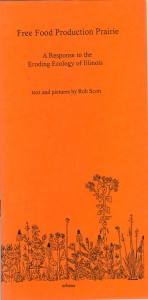 “Free Food Production Prairie” published – a booklet describing 10 edible or medicinal plants which are native to Illinois.
“Free Food Production Prairie” published – a booklet describing 10 edible or medicinal plants which are native to Illinois.
This version can be read straight through: PDF.
This version can be compiled into a brochure again: freefood. Thus the pagination is: [back cover | front cover], [p.26 | p.1], [p.2 | p.25], [p.24 | p.3], [p.4 | p.23], etc.
October 5, 2001
Rob Scott presented “An Introduction to Designing Ecosystems” at the St. Louis Neighborhoods Summit, sponsored by the Lemp Neighborhood Arts Center in St. Louis, MO.
November 30, 2001
Urbana Permaculture Project submits a proposal crafted by Rob Scott to the City of Urbana entitled “Riverbank Stabilization via Prairie Restoration” — the proposal is accepted and a section of the Boneyard Creek is planted with indigenous prairie plants the following spring.
February 16, 2002
The Urbana Permaculture Project hosts its second Perennial Plant Ordering Party at Anacroatan. This year multiple sites were being considered including: Marina’s house on Oregon Street, Laura’s house on Race Street, Danielles’s house on Garfield, a Boneyard Creek project, the Kalyx Center near Monticello, and Davin’s house/Bolozone in St. Louis, MO.
April 1, 2002
Free Food Prairie Fundaraiser at the School for Designing a Society
What on earth is a “free food prairie”? No one knows, but it requires money now to produce an edible prairie in the future…
- 7-8pm social snack time
- 8-9pm an hour of performance
June 22, 2002
Barn Theater at the Kalyx Center
Andy Trull organized a night of theater to raise funds for Permaculture & restoration at the Kalyx Center.
You are invited to come. Work all day fixing up an old farmhouse to create a retreat center for you to use. Then be an evening of theater with each other. And then gather around the bonfire and holler at the flames. Sleep outside – there is no shower available so prepare to share your scent.
There will be musical performances, a dance piece with a typewriter, story readings, a forgetting play with a puppet show, a magic experimental physics show, a slideshow, and caricature drawing!
You are also invited to give money to the project of creating a retreat center at Kalyx.
August 1, 2002
Lease expires at the Oregon St. Garden; this was the first time we experienced a Permaculture site changing hands with the termination of a lease. It has changed hands a few times but is still used as a community garden today, with barbecue pit, picnic benches, etc.
September 9 – November 11, 2002
Permaculture Course at the School for Designing a Society
This class is an invitation: to study ecosystems,
to articulate your desires,
and to design systems preferable to the ones we have.
Permaculture is a movement to “U-Turn” the study of ecology by aiming to design ecosystems which provide the necessities of life for human society. It favors synthetic over analytic research; for this, simple garden tools are fit to the task of conducting complex experiments.
The aim of our learning will be to initiate projects. Light reading required; heavier reading suggested. We will study productive organisms which thrive in the environments of the midwest.
January 16 – March 27, 2003
Permaculture Course at the School for Designing a Society
Permaculture is the project of designing ecosystems to produce life’s necessities. Ecosystems are self-regulating. The relationships between the creatures of an ecosystem take care of themselves. Permaculture is a way of designing these relationships. When an ecosystem is self-regulating, the designer can focus on expanding and changing the system, instead of working to maintain the current system.
The class will cover the concepts of Permaculture, and study plant species of the midwest, by reading and by means of discussion. We will map designs for local gardens, and then we will create these ecosystems in Spring 2003.
February 10, 2003
Perennial Plant Ordering Party at Anacroatan
From 6pm to late night we’ll be perusing plant catalogs while snacking, consorting, etc. in anticipation of spring gardening which will begin in a few months. No knowledge of permaculture or plant materials required.
New Permaculture gardens include the La Casa Collectiva site, and the Ruiz household in North Urbana.
March 8, 2003
Permaculture Fundamentals Course taught by Dave Blume at the Independent Media Center
A special presentation by the Urbana Permaculture Project March 8th 2003 Permaculture is the art and science of ecologically designing human beings’ place in the environment. Going far beyond landscaping, permaculture integrates disciplines relating to food, shelter, energy, water, trees/plants, wildlife, livestock, weather, waste management, economics and social sciences. “Farmer Dave” started the International Institute for Ecological Agriculture (IIEA).
October 12 – October 18, 2003
Build Your Own!!
A one-week Permaculture/Architecture Intensive at the School for Designing a Society.
Isn’t it strange that activists, vegans, even environmentalists live in houses constructed with asphault roofing, fiberglass insulation, old growth wood, quick growth wood, “green” wood laced with lead and arsenic, vinyl siding, plastic paint, and other toxic junk?
Come see an urban Permaculture project in action, participate in alternative building projects, eat delicious vegetarian food, explore a rural savannah restoration, and join a roundtable discussion with Government Housing Authorities!
January 4, 2004
Urbana Permaculture Project becomes fiscal sponsor of the Ecological Construction Laboratory in Urbana, IL.
January 17, 2004
Perennial Plant Ordering Party
Since year 01, the Urbana Permaculture Project has co-ordinated mail-orders of perennial plants, for local use including experimental purposes. This year we’re meeting 1/17/04, 6pm at Anacroatan. This evening will consist of conversation about desirable cultivars of all sortes of fruit, nut, vegetable, herb, etc. for East Central Illinois — the talk will be casual, not causal, and central activity is browsing plant catalogs (with our eyes). Imagine an environment of quiet and excited conversation, by a rolling fire at the Anacroatan house in Urbana.
April 17, 2004
Culinary Edible Mushroom Workshop at the Kalyx Center in Monticello, IL
Have you ever noticed that plebeians have no control over which mushrooms they eat?
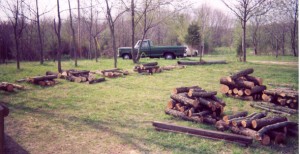 Participants will learn how to innoculate hardwood logs with edible mushrooms, and will go home with logs which will bear mushrooms for 5-7 years. Discussion will focus on innoculation technique, how to get the most “milage” out of your mycelium, the strange vocabulary of mycopermaculture, and further readings. The mushrooms we will be using:
Participants will learn how to innoculate hardwood logs with edible mushrooms, and will go home with logs which will bear mushrooms for 5-7 years. Discussion will focus on innoculation technique, how to get the most “milage” out of your mycelium, the strange vocabulary of mycopermaculture, and further readings. The mushrooms we will be using:
- Shiitake (Lentinula edodes)
- Chicken-of-the-Woods (Laetiporus sulphureus)
- Hen-of-the-Woods (Grifola frondosa) a.k.a. Maitake
- Lion’s Mane (Hericium erinaceus)
- Reishi/Ling Chi (Ganoderma lucidum)
Note: the Reishi/Ling Chi mushroom is usually dried, then taken as a tea for its adaptogenic properties. It is use extensively in Chinese Medicine. This mushroom is not “delicious” and is not eaten as “food”.
Participants will leave with at least one log of each of the above mushroom varieties. For this reason space is limited. The cost for the whole day, including materials (logs and lunch) is $35.
October 22-24, 2004
Ecological Construction Symposium hosted at the Civitas Design Center in Downtown Urbana
In its second year, The Ecological Construction Symposium, is a forum for presenting design projects which currently exist, as well as proposals for future projects which have yet to be designed. Presentations and design charettes will focus on projects in Permaculture, Passive Architecture, and Public Policy.
Symposium co-sponsors include:
- Urbana Permaculture Project
- Ecological Construction Laboratory
- School for Designing a Society
- Civitas Design Center
- City of Urbana
January 22, 2005
Permaculture Project’s Perennial Plant Party (PPPPP)
Announcement: fourth Perennial Plant Party! This year in a new location, the Park House, but the aim remains the same: increasing the number of floral alternatives. Come, ponder: the pool of freely propagatable plants, the commercialist mail-order plant catalogs, and local growers trying to design a road away from consumerism. These are contradictions, we are not new-age gangsters, and we plan to increase the degree to which our Urbana is edible. Pawpaws, jujubes, bamboo shoots… The Perennial Plant Party is a time to coordinate our language and plants in order to expand the variety of our horticultural sphere.
March 19, 2005

Fermentation Workshop at the Parkhouse in Urbana
Fermented foods are a part of human nutrition in all temperate climate societies. Kimchee in Korea. Sauerkraut in Germany. Reindeer-milk with Rennet Beer in Northern Canada. Bud Lite, Wonder Bread and Velveeta in USA.
Urbana has enough freely available fruit to develop serious self-reliance in fruit wines. Therefore: an event to inspire fermenters of the future. Fermented foods are the home-biodeisel of the human machine. We travelled through the winds and rains meet, eat, and invent ferments. The wines made us laugh, the horseradish made us cry…
Participants sampled locally made fruit and vegetable wines: persimmon wine, tomato wine, elderberry wine, rhubarb melomel, hot pepper wine, dry mead, aronia wine, concord grape wine, sparkling raspberry wine, pear wine, and various hybrid beverages. Apple juices fermented with different wine yeasts were taste-sampled for yeast characteristics. Kombucha (a black-tea drink) was enjoyed for its multiple fermentation products: lactic acid, ethanol, acetic acid. Vinegar was used to preserve freshly grated horseradish roots, which were provided in great abundance. Various apple wines were produced with spices and honey added. Each participant went home with at least a gallon of wine, and a jar of horseradish. Workshop fee was $25.
 March 26, 2005
March 26, 2005
Permaculture in Palestine
A Presentation by Murad of the Marda Permaculture Project (in the West Bank)
Murad will speak about permaculture design, and the challenges facing permaculture in Palestine past, present, and future. Murad has a prepared slide show of permaculture in Marda. $5 minimum donation. Dinner included.
Additional donations help Murad rebuild the Marda Permaculture Project!
 October 0, 2005
October 0, 2005
Ecological Construction Symposium
The Urbana Permaculture Project has never shied away from impossible projects, and this year’s symposium was no exception. We debated the important distraction of space exploration, and the potential for ecological design on the Moon. Read the program (.pdf).
We declare that sending life into outer space is a misuse of Earth’s resources.
December 15, 2005
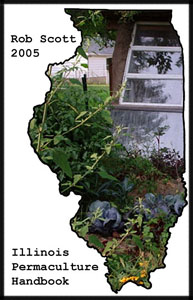 Illinois Permaculture Handbook
Illinois Permaculture Handbook
Announcing the unavailable release of a new Permaculture book written specifically for Illinois. Written by Rob Scott, this 130 page book is the first book-length work to tackle the subject of Permaculture with an emphasis on the natural and social constraints of a midwest corn-belt state. Ironically, Permaculture has put itself in the service of disaster areas, while the most fertile soils on the planet have scarcely a site-specific phoneme.
Broken into six chapters full of color illustrations:
- Introduction to Permaculture
- Site Design in Illinois
- Permaculture and Staple Crops
- Tree Crops for Illinois
- Permaculture and Fermented Foods
- Permaculture Economy
January 16, 2006
 Brickstorming
Brickstorming
We are investigating the structure of structure. We can use readily available materials in this town to make hard structures with soft edges. We will take a hands on approach to touching society’s guts and operating on them. You will find it difficult to “experience” this event, after it has happened. By making informed life choices we set ourselves up to reflect on tender memories together.
February 18, 2006
The Plant Ordering Party dithers like a deflating balloon…
For five consecutive years we pooled our efforts when mail-ordering plants. We saved on shipping costs, and looked each other in the eye while deciding which photosynthetic aliens we would import. We now have a whopping big number of plants on our Permaculture sites. The door is open: the eye contact and plant catalogs will be yours to savor. But no one is offering to pool the purchasing. Hey, propagate a perennial!!
March 11, 2006
Fermentation Workshop recurs!
The bizarre accomplishments of the 2005 Fermentation workshop included such anomalies as a SugarWater Wine, Habanero Capsimel, Black Pepper Metheglin, Horseradish sauce, and carbonated Kimchi. This year’s fermentation workshop will again focus primarily on winemaking, but this time with more presentation, step-by-step instruction, and (most likely) pre-determined wine recipes. In short, the teaching component will be more orderly (it couldn’t be less) and we will not get drunk beforehand. After we’ve made sober choices, we will sample a dozen local wines. Lacto-fermentations will also be discussed, and sampled. There are 8 bottles of Applejuice Wine from last year’s workshop that will go to the first 8 registrants. Workshop fee is $30.
Download the pdf flyer for the event here (.pdf).
April 1, 2006
Combustable Ecosystem Demonstration
We conducted a controlled prairie brushfire at the Kalyx Center on the edge of Allerton Park. Several volunteers helped manage the slow creep of flames over an area of regenerating barrens prairie at this unique retreat center made of found and appropriate materials.
May 20, 2006, noon, departing from La Casa garden on Maple St.
Urbana Bamboo Tour
What the heck? Bamboo in Illinois? Yes. This strange cane is growing culms in cranneys and nooks in Urbana. 16 species, at present count. Mainly of the genus Phyllostachys, these are some of the fastest growing plants on earth. Bamboo can provide food, shelter, and miscellany (umbrella handles, fishing poles, trellis stakes). It’s reputation as an invasive is unwarranted. Bamboo only flowers once every 100 years and then it dies after setting seed. There are no natural ecosystems in Illinois in which Bamboo is an invasive pest, period. Come find out about the resource of bamboo. Dig into the bamboo propagation project and take a cutting with you.
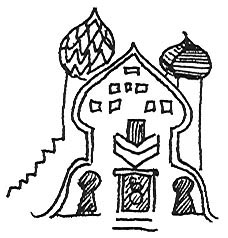 |
June 1-30, 2006 at the Gesundheit Institute in West Virginia
School for Designing a Society Urbana is the only town in the world which has a resident School for Designing a Society. In June, the Gesundheit Institute will host a Summer School in which participants are invited to ask the question “What would I consider a desirable society?” Here, and perhaps no where else, is Permaculture Design engaged alongside an experiment aimed at inventing new social structures. Which society are we seeking to make sustainable?! |
Outer Space Committee at the Independent Media Center
After the local Independent Media Center (IMC) bought the downtown Urbana post office, the School for Designing a Society moved into the basement and an “outer space committee” convened to design the landscape around the building. In September this led to a brief excursion into parking lot design at the School for Designing a Society.
October 13-15, 2006
4th Perennial Ecological Construction Symposium
In its fourth year, the Ecological Construction Symposium, is a weekend of Permaculture and Architecture. Presentations in the past have focused on Passive Architecture, Cob Construction, Public Housing in Urbana, Strawbale Construction, Designing Society, and of course Permaculture.Check out 2004’s Ecological Construction Symposium.
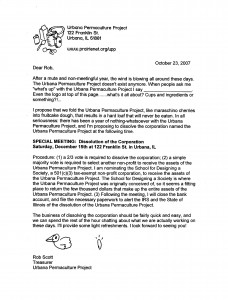 Also see the 2005 Lunar Ecological Construction Symposium (pdf).
Also see the 2005 Lunar Ecological Construction Symposium (pdf).
2007
Urbana Permaculture Project is Defunct
In 2007, no activities were organized under the banner of the Urbana Permaculture Project, although all members of the U.P.P. Board had projects of their own: Bill Taylor was running the Kalyx Center; Lisa Haynes ran Tomahnous Farm; Kat Klingenberg was running the Ecological Construction Laboratory; Clint Popetz was running the Common Ground Food Co-op; Rob Scott was running the School for Designing a Society; Todd Rusk had just established Love Pond Garden.
In this letter (pdf), dated October 23, 2007 Rob Scott proposes the dissolution of the Urbana Permaculture Project in light of the absence of activity.
2008
Kalyx Center for Sustainability is Born
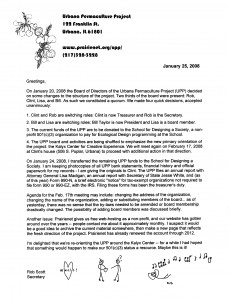 A meeting held on January 20, 2008 resulted in a shuffling of the Board of Directors, and the re-organization of the project around the programming at the Kalyx Center near Monticello, IL. The project’s funds were given to the School for Designing a Society, and on February 17, 2008 the non-profit was formally re-named Kalyx Center for Sustainability. This January 25th letter (pdf) to the board documents the changes.
A meeting held on January 20, 2008 resulted in a shuffling of the Board of Directors, and the re-organization of the project around the programming at the Kalyx Center near Monticello, IL. The project’s funds were given to the School for Designing a Society, and on February 17, 2008 the non-profit was formally re-named Kalyx Center for Sustainability. This January 25th letter (pdf) to the board documents the changes.
In 2008, the website became a text-only announcement that the Urbana Permaculture Project had been officially renamed the “Kalyx Center for Sustainability”.
2009: Website Disappears
January 1, 2009, the community internet service provider (Prairienet) terminated its web hosting services, and the website was taken offline.
2011: Website Re-Appears as Archive
The current version of the website was posted in July of 2011.

